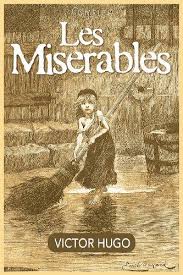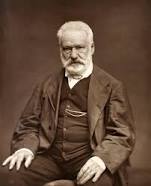Les Misérables Page #4
Les Misérables is a French historical novel by Victor Hugo, first published in 1862, that is considered one of the greatest novels of the 19th century. In the English-speaking world, the novel is usually referred to by its original French title.
Thus he discoursed gravely and paternally; in default of examples, he invented parables, going directly to the point, with few phrases and many images, which characteristic formed the real eloquence of Jesus Christ. And being convinced himself, he was persuasive. CHAPTER IV--WORKS CORRESPONDING TO WORDS His conversation was gay and affable. He put himself on a level with the two old women who had passed their lives beside him. When he laughed, it was the laugh of a schoolboy. Madame Magloire liked to call him Your Grace [Votre Grandeur]. One day he rose from his arm-chair, and went to his library in search of a book. This book was on one of the upper shelves. As the bishop was rather short of stature, he could not reach it. "Madame Magloire," said he, "fetch me a chair. My greatness [grandeur] does not reach as far as that shelf." One of his distant relatives, Madame la Comtesse de Lô, rarely allowed an opportunity to escape of enumerating, in his presence, what she designated as "the expectations" of her three sons. She had numerous relatives, who were very old and near to death, and of whom her sons were the natural heirs. The youngest of the three was to receive from a grandaunt a good hundred thousand livres of income; the second was the heir by entail to the title of the Duke, his uncle; the eldest was to succeed to the peerage of his grandfather. The Bishop was accustomed to listen in silence to these innocent and pardonable maternal boasts. On one occasion, however, he appeared to be more thoughtful than usual, while Madame de Lô was relating once again the details of all these inheritances and all these "expectations." She interrupted herself impatiently: "Mon Dieu, cousin! What are you thinking about?" "I am thinking," replied the Bishop, "of a singular remark, which is to be found, I believe, in St. Augustine,--'Place your hopes in the man from whom you do not inherit.'" At another time, on receiving a notification of the decease of a gentleman of the country-side, wherein not only the dignities of the dead man, but also the feudal and noble qualifications of all his relatives, spread over an entire page: "What a stout back Death has!" he exclaimed. "What a strange burden of titles is cheerfully imposed on him, and how much wit must men have, in order thus to press the tomb into the service of vanity!" He was gifted, on occasion, with a gentle raillery, which almost always concealed a serious meaning. In the course of one Lent, a youthful vicar came to D----, and preached in the cathedral. He was tolerably eloquent. The subject of his sermon was charity. He urged the rich to give to the poor, in order to avoid hell, which he depicted in the most frightful manner of which he was capable, and to win paradise, which he represented as charming and desirable. Among the audience there was a wealthy retired merchant, who was somewhat of a usurer, named M. Géborand, who had amassed two millions in the manufacture of coarse cloth, serges, and woollen galloons. Never in his whole life had M. Géborand bestowed alms on any poor wretch. After the delivery of that sermon, it was observed that he gave a sou every Sunday to the poor old beggar-women at the door of the cathedral. There were six of them to share it. One day the Bishop caught sight of him in the act of bestowing this charity, and said to his sister, with a smile, "There is M. Géborand purchasing paradise for a sou." When it was a question of charity, he was not to be rebuffed even by a refusal, and on such occasions he gave utterance to remarks which induced reflection. Once he was begging for the poor in a drawing-room of the town; there was present the Marquis de Champtercier, a wealthy and avaricious old man, who contrived to be, at one and the same time, an ultra-royalist and an ultra-Voltairian. This variety of man has actually existed. When the Bishop came to him, he touched his arm, "You must give me something, M. le Marquis." The Marquis turned round and answered dryly, "I have poor people of my own, Monseigneur." "Give them to me," replied the Bishop. One day he preached the following sermon in the cathedral:-- "My very dear brethren, my good friends, there are thirteen hundred and twenty thousand peasants' dwellings in France which have but three openings; eighteen hundred and seventeen thousand hovels which have but two openings, the door and one window; and three hundred and forty-six thousand cabins besides which have but one opening, the door. And this arises from a thing which is called the tax on doors and windows. Just put poor families, old women and little children, in those buildings, and behold the fevers and maladies which result! Alas! God gives air to men; the law sells it to them. I do not blame the law, but I bless God. In the department of the Isère, in the Var, in the two departments of the Alpes, the Hautes, and the Basses, the peasants have not even wheelbarrows; they transport their manure on the backs of men; they have no candles, and they burn resinous sticks, and bits of rope dipped in pitch. That is the state of affairs throughout the whole of the hilly country of Dauphiné. They make bread for six months at one time; they bake it with dried cow-dung. In the winter they break this bread up with an axe, and they soak it for twenty-four hours, in order to render it eatable. My brethren, have pity! behold the suffering on all sides of you!" Born a Provençal, he easily familiarized himself with the dialect of the south. He said, "En bé! moussu, sés sagé?" as in lower Languedoc; "Onté anaras passa?" as in the Basses-Alpes; "Puerte un bouen moutu embe un bouen fromage grase," as in upper Dauphiné. This pleased the people extremely, and contributed not a little to win him access to all spirits. He was perfectly at home in the thatched cottage and in the mountains. He understood how to say the grandest things in the most vulgar of idioms. As he spoke all tongues, he entered into all hearts. Moreover, he was the same towards people of the world and towards the lower classes. He condemned nothing in haste and without taking circumstances into account. He said, "Examine the road over which the fault has passed."
Translation
Translate and read this book in other languages:
Select another language:
- - Select -
- 简体中文 (Chinese - Simplified)
- 繁體中文 (Chinese - Traditional)
- Español (Spanish)
- Esperanto (Esperanto)
- 日本語 (Japanese)
- Português (Portuguese)
- Deutsch (German)
- العربية (Arabic)
- Français (French)
- Русский (Russian)
- ಕನ್ನಡ (Kannada)
- 한국어 (Korean)
- עברית (Hebrew)
- Gaeilge (Irish)
- Українська (Ukrainian)
- اردو (Urdu)
- Magyar (Hungarian)
- मानक हिन्दी (Hindi)
- Indonesia (Indonesian)
- Italiano (Italian)
- தமிழ் (Tamil)
- Türkçe (Turkish)
- తెలుగు (Telugu)
- ภาษาไทย (Thai)
- Tiếng Việt (Vietnamese)
- Čeština (Czech)
- Polski (Polish)
- Bahasa Indonesia (Indonesian)
- Românește (Romanian)
- Nederlands (Dutch)
- Ελληνικά (Greek)
- Latinum (Latin)
- Svenska (Swedish)
- Dansk (Danish)
- Suomi (Finnish)
- فارسی (Persian)
- ייִדיש (Yiddish)
- հայերեն (Armenian)
- Norsk (Norwegian)
- English (English)
Citation
Use the citation below to add this book to your bibliography:
Style:MLAChicagoAPA
"Les Misérables Books." Literature.com. STANDS4 LLC, 2025. Web. 5 Feb. 2025. <https://www.literature.com/book/les_mis%C3%A9rables_13>.








Discuss this Les Misérables book with the community:
Report Comment
We're doing our best to make sure our content is useful, accurate and safe.
If by any chance you spot an inappropriate comment while navigating through our website please use this form to let us know, and we'll take care of it shortly.
Attachment
You need to be logged in to favorite.
Log In